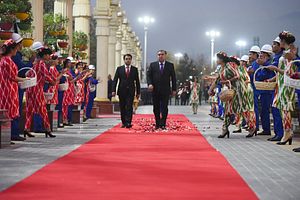On August 6, a joint session of Tajikistan’s bicameral parliament — chaired by Rustam Emomali, son of the president — decided to hold the county’s next presidential election in October. Tajikistan’s last presidential election was held on November 6, 2013. In 2013, Emomali Rahmon won a fourth term with 83.92 percent of the vote. Rahmon has been in power since 1992 and no election in Tajikistan’s independent history has been judged free and fair by reputable international observers.
The 2020 election could be a turning point — or not — given previous rumors that Rahmon might not run again and instead attempt to pass the presidential baton to his son, Rustam.
Back in January 2019, looking far ahead to the election, I wrote:
With the 2020 election more than a year away, there’s only so much forecasting that can be done. But keeping an eye on the Rahmon family, the exiled opposition, and on the ground in Tajikistan for the budding of any domestic-based opposition forces are good places to start. Could 2020 be different? Probably not, but it’s a long year ahead, and much could happen.
Much has indeed happened.
In the realm of the foreseeable: The Rahmon family continued solidifying its position, particularly that of Rustam. In 2017, Rustam was appointed mayor of Dushanbe by his father and earlier this year, he was elected chair of the Majlisi Milli (National Assembly), the Tajik Parliament’s upper chamber. The position set Rustam, 32, as second-in-line for the presidency, should anything incapacitate his father, who will turn 68 on October 5. A 2016 referendum lowered the age to contest the presidency from 35 to 30 as well as removing term limits for Rahmon.
If that’s not a stacked deck, I don’t know what is. There’s nothing to stop Emomali Rahmon from running again and in the event he decides to steps down, his son Rustam is invariably next in line.
Meanwhile, though there remains a Tajik opposition in exile, the likelihood of a triumphant return to contest the presidency at this moment seems impossible. As for alternative candidates from inside the country, little has been said. Back in early 2019, Quvvatali Murodov, a retired doctor, was reportedly considering a run — eliciting a near immediate smear campaign against him. An article about the situation ran on RFE/RL under a headline that began with “Crazy Talk.”
That brings us to the realm of the unforeseeable: The coronavirus pandemic has permeated all aspects of life and that will include elections.
As other Central Asian states began recording cases in March, Tajikistan steadfastly denied that the virus had entered the country amid mounting evidence to the contrary. In late April, Dushanbe finally started reporting cases; as of August 8, Tajik authorities have officially recorded 7,625 cases of COVID-19 and 61 deaths. Kazakhstan and Kyrgyzstan in recent weeks registered a new wave of infections with sharp spikes in cases when those patients likely, but not confirmed by a test, to have COVID-19 are accounted for. It stands to reason that Tajikistan — with arguably a poorer health care system than Kazakhstan — would also be seeing a similar rise in cases.
A pandemic is a difficult time for an election anywhere, but in a democracy at least presents an opportunity to, as the saying goes, “throw the bums out.” A democracy on paper, Tajikistan is an unlikely spot for an upset of any kind or an opposition victory (that would necessitate an opposition). The pandemic’s influence may be seen in Rahmon’s decision to run or pass the state to Rustam, depending on how the family calculates the path of greatest stability for the regime.

































